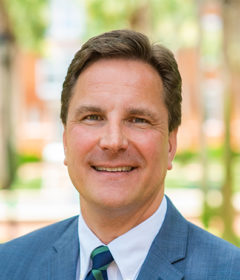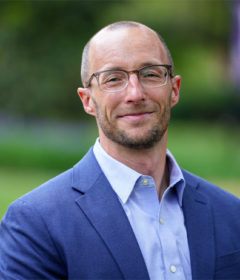Stetson adopts water-sustainability theme
Stetson University is dedicating the 2011-2012 academic year to one of life’s most precious natural resources: water.
The central Florida university has adopted “water sustainability” as its theme this year as part of its broader commitment to environmental responsibility.
“Water sustainability is a critical issue in Florida,” said Dr. William J. Ball, visiting associate professor of political science. ”We think of this as a place with an abundance of water. However, rapid and water-intensive development has imperiled our water resources. Individually and collectively, we’ve been treating water as something that has little value rather than recognizing it as one of our key assets.
“The current pause in new pressures on water due to the slowdown in growth is the perfect time to re-examine what we are doing with water and implement strategies for preserving the natural environment around water and plan for future economic change that has water sustainability as a core value,” he said. “We all can learn to be more thoughtful about water.”
Highlights of Stetson’s water theme include field study, surveys on water usage, water-themed academic courses, public education, student and faculty research, guest lecturers and films, and student and employee volunteerism focused on protecting natural water resources such as Blue Spring, the St. Johns River and the Atlantic Ocean. Water sustainability is the inaugural theme from a constellation of environmental practices and initiatives known as “Stetson GREEN.”
“We have had many people working independently on water conservation issues for many years, through faculty research, student research, faculty-student service projects and programs to increase water-use efficiency on campus,” said Dr. Kirsten Work, associate professor of biology. “Through Stetson GREEN this year, people from all over Stetson have come together to plan water conservation-themed activities that allow students to be part of something bigger than one class activity.”
“The thrust is teaching the community about the importance of sustainable water use, how to help protect this vital resource, and how water, nature and humans are interconnected,” added Dr. Melissa Gibbs, associate professor of biology.
Stetson will host a public forum on “Water Sustainability Issues in Central Florida” on the evening of Tuesday, Nov. 1. The event will focus on groundwater use and surface water pollution.
Other activities planned for October and November include a cleanup of Blue Spring State Park, invasive species removal at Spruce Creek and Rose Bay, restoration work at the Marine Discovery Center and a cleanup at Bicentennial Youth Park. Many current academic courses in DeLand and at the College of Law in Gulfport/St. Petersburg relate to water conservation issues.
Earlier this semester, students in Gibbs’ Aquatic and Marine Biology class took a two-hour eco-tour and explored the fish, birds and aquatic insects in the St. Johns River to kick off the school year. Marketing Professor Michelle DeMoss’ Consumer Dynamics class and Work’s Biology II and Conservation Biology classes cleaned a section of New Smyrna Beach as part of the Ocean Conservancy’s Coastal Cleanup in September.
Malissa Dillon of the St. Johns River Water Management District’s Community and Intergovernmental Program visited Stetson to talk with students about water use and educational campaigns on reducing water consumption. Students in several classes in the Natural Sciences Division are working together on a survey that will measure Stetson students’ and employees’ attitudes, understanding and practices regarding water use. Work’s Conservation Biology class is conducting a community-based research project to determine the best way to reintroduce eel grass into Blue Spring. The many water-related classes this year include Oceanography, Nature Writing, Sustainable Communities, Conservation Biology, Sustainability Studies, Ocean & Coastal Law & Policy and Environmental Law.
A brochure filled with energy and water conservation tips was provided to students at the start of school. Renovations, including this summer’s improvements in the Carson-Hollis residence halls, use water-saving plumbing fixtures. A comprehensive study has been conducted to help Stetson reduce water consumption overall.
At the College of Law, former director of Everglades restoration for the U.S. Dept. of the Interior Michael L. Davis recently spoke to Stetson Law students about planning for the future of the Florida Keys. In 2010, Stetson Law became the first law school in the world to sign a memorandum of cooperation with the Switzerland-based Ramsar Secretariat, assisting the international treaty organization that works to conserve wetlands. Interim Dean Royal C. Gardner, director of Stetson’s Institute for Biodiversity Law and Policy, recently published the book Lawyers, Swamps, and Money: U.S. Wetland Law, Policy, and Politics, which proposes approaches to protect sensitive aquatic resources. Gardner and law students camped, canoed and kayaked at Everglades National Park in the spring to learn more about the park. Stetson Law students regularly participate in cleanup projects, most recently at Weedon Island Preserve in St. Petersburg and Clam Bayou Nature Preserve in Gulfport.
Stetson GREEN is one of Stetson’s new Constellations of Excellence. “Constellations” are areas where Stetson’s interdisciplinary strengths and expertise can be focused, built and celebrated across the university’s four colleges and schools and four campuses or centers, said Dr. Elizabeth “Beth” Paul, provost and vice president for academic affairs.
Also being developed as a Stetson constellation at this time is the Off-Center for Creative Practice, an interdisciplinary effort for increased interaction by students and faculty in the university’s creative disciplines – art, theater, digital arts, creative writing and music composition.
For more information on this year’s water theme, contact [email protected].



